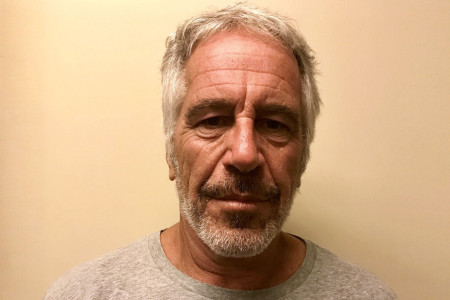The estate of Jeffrey Epstein and the attorney general of the U.S. Virgin Islands announced Friday that they have reached tentative agreement on a long-delayed compensation fund for sexual abuse victims of the disgraced financier.
Executors of Epstein’s estate — two of his longtime lawyers — had proposed last November the creation of a fund to pay victims who might want to remain unidentified. But Attorney General Denise George thwarted those plans, raising concerns that the estate might be closing off avenues of redress to Epstein’s victims. In January, she filed a civil enforcement action, later labeling the estate a criminal enterprise, and slapped liens on the late Epstein’s properties, ratcheting up pressure by making it hard to pay employees and bills.
In recent months the two sides battled it out via court filings to the probate court in the Virgin Islands, location of Epstein’s main residence among his many properties in the United States and abroad. Each side asked a judge to intervene, claiming the other side was intransigent. Then Friday afternoon, the attorney general issued a news release saying the two sides had reached agreement on the fund.
“The Attorney General’s Office, working closely with Epstein’s victims and their counsel, have now reached an agreement upon the terms of the fund, which include a set of reforms that provide a process that will be more fair, credible, and victim-oriented,” the statement from George’s office read. “Through the discussions, the Attorney General made clear her support of a compensation fund that would allow victims to avoid the publicity and trauma of a trial and provide them, promptly, with a measure of justice and closure.”
The statement signaled that the probate court must still OK the agreement, and George did not include any comments from the Epstein estate in her news release.
In a statement to the Herald, the co-executors of Epstein’s estate — Darren K. Indyke and Richard Kahn — confirmed her broad outline.
“The Co-Executors of the Estate of Jeffrey Epstein are extremely pleased that the USVI Attorney General has dropped her opposition to the Epstein Victims’ Compensation Program, and allowed it to proceed as funded entirely by the Estate,” said the statement. “This is the culmination of the Co-Executors’ sustained, eight-month-long effort to design, develop and implement the Program — with the assistance of independent, nationally recognized claims administration experts and with extensive input from all interested parties, including claimants and their legal representatives — in order to provide all eligible claimants an opportunity to receive compensation and voluntarily resolve their claims of sexual abuse through a confidential, non-adversarial process that is sensitive to the experiences and concerns of claimants and treats them with compassion, dignity and respect.”
There are an estimated 70 claimants, according to U.S. court documents, some of whom would seek compensation through the fund. It is slated to be run by Jordana Feldman, a lawyer who co-administered a similar fund for families of those affected by the Sept. 11, 2001, terror attacks.
“We are pleased that the parties have reached a resolution that allows victims the opportunity to resolve their sexual abuse claims through this independent, voluntary, non-adversarial process,” Feldman and her co-designers of the compensation program said in a statement.
Epstein died last Aug. 10 in a New York jail cell, arrested on allegations that he continued to abuse underage girls even after a deal negotiated a decade earlier in Florida that allowed him to escape a long prison term, highlighted by the Herald in its Perversion of Justice series. The settlement of his estate has become a tangle, with complications in accounting for his assets and selling them.
George signaled she’d won much of what she sought, especially the involvement of victim advocate Marci Hamilton, who heads Child USA and is a leading expert on child sexual abuse issues, having worked with victims of abuse by Roman Catholic priests. The Epstein estate had opposed her involvement as unnecessary.
“This will help ensure that the decisions of the fund administrator are fully informed by and sensitive to the unique experiences and needs of survivors of trafficking and sexual abuse,” the statement from George said.
Other demands met, she said, include dedicated funding so that victims who haven’t come forward or aren’t satisfied with the claims process can still choose to opt out without sacrificing their chance of a judgment or recovery.
The probate court in the Virgin Islands must still approve the tentative agreement, and at least one law firm involved in representing Epstein’s victims is reserving judgment on the deal.
“Obviously anytime there is a victims’ compensation fund they are looking to limit exposure and liability for wrongdoing. I look forward to a thorough review of the proposal before weighing in,” said Joshua Schiffer, a partner in the firm ChancoSchiffer, whose partner Douglas Chanco is pursuing claims in the Virgin Islands on behalf of Jennifer Araoz, a New York woman who said Epstein raped her when she was 15.
Victims’ attorneys worry that the Virgin Islands’ attorney general has put the territory ahead of Epstein’s victims in the compensation line. George has denied that.
“I’m hopeful the Agreement will receive final approval, so these women are able to receive the help they need,” George said Friday. “My office will forcefully continue its work to hold accountable Epstein’s criminal enterprise through the Government’s CICO [criminal enterprise] lawsuit and send a clear message that the USVI is not, and will not, be a safe haven for sex traffickers or sexual abuse.”
Original article found here.








